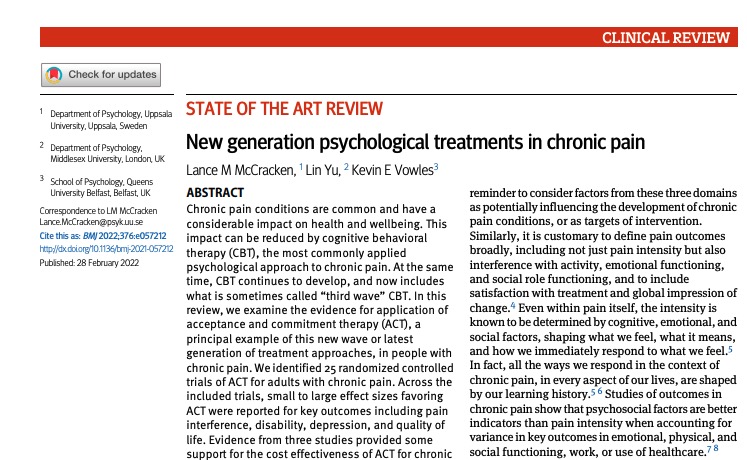Key findings
- 25 randomised controlled trials of ACT for chronic pain were identified.
- ACT showed favourable effect sizes for key outcomes such as pain interference, disability, depression, and quality of life.
- Some evidence supports the cost effectiveness of ACT for chronic pain based on three studies.
- Theoretical processes of change, specifically psychological flexibility, played a mediating role in treatment outcomes.
Background to the study
Chronic pain is typically defined as pain that lasts or recurs beyond the normal healing time, usually three months. Managing chronic pain within conventional healthcare has always been a challenge. The classification of chronic pain has been difficult, resulting in confusion and potential neglect in research and treatment approaches. To address this, chronic pain has been categorised as primary or secondary. Primary chronic pain refers to pain that is the main or sole complaint, considered a distinct condition. Secondary chronic pain, on the other hand, is when pain is a symptom of an underlying disease.
In the classification of chronic primary pain, in addition to being persistent, a defining feature is that it is accompanied by significant emotional distress and interference with daily functioning, not attributable to another condition. This classification acknowledges chronic primary pain as a legitimate clinical concern, whether it is the primary issue or linked to another condition.
Chronic pain is often described as a bio-psycho-social problem. While this description does not offer a specific model or mechanism of pathology, it highlights the importance of considering factors from the biological, psychological, and social domains as potential influences on the development of chronic pain conditions, as well as targets for intervention.
In assessing pain outcomes, it is customary to consider not only pain intensity but also the impact on activities, emotional well-being, social roles, as well as satisfaction with treatment and overall perception of change. Even within the experience of pain itself, its intensity is known to be influenced by cognitive, emotional, and social factors, shaping our perception, interpretation, and immediate response to pain. In fact, our responses to chronic pain in all aspects of life are influenced by our learning history. Studies on outcomes in chronic pain have shown that psychosocial factors are better predictors than pain intensity when it comes to emotional, physical, and social functioning, work, and healthcare utilisation.
Study methods
The purpose of this review was to provide an updated, comprehensive, and inclusive summary of the evidence for acceptance and commitment therapy (ACT), a recent development in cognitive-behavioural therapy (CBT), in the treatment of chronic pain, including headaches. The review covers long-term outcomes, cost-effectiveness, mechanisms of change, and factors that may moderate or predict treatment outcomes.
In trials evaluating treatments for chronic pain, it is recommended to include various clinical outcome measures that cover domains such as pain, physical functioning, emotional functioning, role functioning, and coping, whenever possible. The studies reviewed for this study frequently used measures of pain, pain interference, disability, depression, anxiety, and quality of life. A total of 25 randomised controlled trials were included in the review.
Findings
ACT demonstrates significant benefits for chronic pain, including reductions in pain interference, disability, and depression, as well as improved quality of life. The evidence suggests that ACT is comparable to traditional CBT, but with stronger support for its specified processes of change.
Long term
Follow-up assessments at three or six months show continued beneficial effects of ACT treatment for chronic pain. In a Swedish trial, significant improvements in pain, pain interference, depression, anxiety, and insomnia were observed at 12 months. Another trial comparing ACT with applied relaxation showed significant effects for pain, daily functioning, satisfaction with life, and pain acceptance. Sustained improvements in physical and emotional functioning were also seen in a cohort study three years after treatment.
Cost effectiveness
Three randomised controlled trials (RCTs) included in this review examined the cost effectiveness of ACT for chronic pain. These studies generally support the cost effectiveness of ACT compared to other interventions in other trials.
McCracken, L. M., Yu, L., & Vowles, K. E. (2022). New generation psychological treatments in chronic pain. The BMJ, 376, Article e057212.
Download paper here

